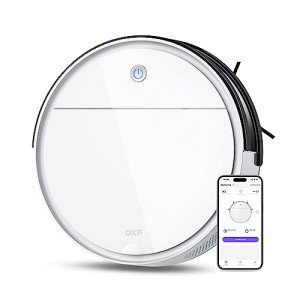10 Undeniable Reasons People Hate Automated Vacuum
The Rise of the Automated Vacuum: A Comprehensive Overview
As innovation continues to evolve, so too does the way we approach daily tasks, including cleaning our homes. The advent of automated vacuums, commonly known as robotic vacuums, has actually changed the landscape of household tasks, using a level of convenience previously inconceivable. Robotic Vacuum Cleaner Sale dives deep into the features, benefits, obstacles, and future of automated vacuums, illuminating why they are ending up being a staple in contemporary homes.
What is an Automated Vacuum?
Automated vacuums are self-operating gadgets created to tidy floors while requiring very little human intervention. Equipped with sensors, they browse spaces, avoid obstacles, and go back to their charging stations when short on battery. Many models even use programmability through smartphone apps, enabling users to set cleaning schedules or control the vacuum remotely.
Secret Features of Automated Vacuums
Feature
Description
Navigation
Uses sensors and cameras to map out spaces, allowing for systematic cleaning paths.
Programmable Cleaning
Users can arrange cleanings by means of mobile apps or pre-set timers on the gadget.
Smart Home Integration
Compatibility with smart home systems (e.g., Alexa, Google Home) for voice control.
Dirt Detection
Advanced models can determine locations with more dirt and concentrate on them for deeper cleaning.
Charge Dock
Automatically returns to its charging station when battery levels are low.
Multiple Surface Cleaning
Can shift effortlessly in between different floor types, consisting of carpet, tile, and hardwood.
Advantages of Automated Vacuums
Time-Saving: Automated vacuums can significantly lower the time invested in home chores, allowing users to allocate their time to more pleasurable activities.
Consistency: These gadgets provide a constant cleaning schedule, guaranteeing that dirt and dust don't have a possibility to accumulate.
Ease of access: Individuals with mobility difficulties may find automated vacuums particularly beneficial, as they ease the physical needs of vacuuming.
Technological Innovation: Many designs include advanced functions such as app control, which makes it possible for users to keep an eye on and manage their vacuum from virtually anywhere.
Energy Efficient: Most robotic vacuums are created to run effectively, using less energy than traditional vacuum.
Disadvantages to Consider
While the advantages of automated vacuums are numerous, there are also some possible disadvantages:
- Cost: While costs have ended up being more competitive, high-end models can still be a significant financial investment.
- Limited Suction Power: Robotic vacuums may not offer the very same effective suction as traditional designs, specifically on high-pile carpets.
- Maintenance Needs: Users should frequently clean brushes and filters to maintain ideal efficiency.
- Size Restrictions: Some students may have a hard time to navigate tight areas or high furnishings, resulting in areas that stay uncleaned.
Popular Brands and Models
When investing in an automated vacuum, it's important to select a credible brand that fits individual cleaning requirements. Here are some widely-regarded options in the market:
Brand
Design
Secret Features
iRobot
Roomba i7+
Self-emptying base, advanced smart mapping, Alexa compatible.
Ecovacs
Deebot Ozmo T8
Integrated mopping function, excellent navigation, and smart home compatibility.
Roborock
Roborock S7
Strong suction power, sonic mopping, multi-floor mapping.
Neato Robotics
Neato D7
D-shape style for corners, LaserSmart mapping innovation.
Future of Automated Vacuums
The trajectory for automated vacuums points towards greater elegance and combination with smart home innovations. As expert system (AI) becomes more ingrained in family devices, future models are anticipated to utilize machine discovering to enhance their cleaning effectiveness and navigational abilities.
Potential improvements consist of:
- Enhanced AI Learning: Improved algorithms permitting vacuums to learn user practices and adapt their cleaning schedules appropriately.
- Improved Navigation: Continued advancement of LiDAR and camera systems for much better obstacle avoidance and mapping.
- Multifunctionality: The development of vacuums that can not just tidy floorings but also deal with dusting and other household chores.
Often Asked Questions (FAQs)
Q1: Can automated vacuums clean carpets effectively?
A1: Many modern automated vacuums feature strong suction capabilities and specialized brushes produced for carpet cleaning. Nevertheless, deep cleaning high-pile carpets might still require conventional vacuuming techniques.
Q2: How long do automated vacuums typically operate on a single charge?
A2: The runtime can vary by model, however many robotic vacuums can run between 60 to 120 minutes before needing a recharge. More advanced models might have longer runtimes.
Q3: Are automated vacuums ideal for homes with pets?
A3: Yes, lots of automated vacuums are designed with pet owners in mind. They often include stronger suction and tangle-free brushes that can get pet hair effectively.
Q4: How frequently should I run my automated vacuum?
A4: This mainly depends upon the foot traffic in your home and individual preference, but numerous users find running it day-to-day or every other day keeps their floors tidy.
Q5: Can I by hand manage my automated vacuum?
A5: Yes, most automated vacuums include handbook control options by means of remote or mobile apps, enabling users to direct the vacuum to particular locations.
Automated vacuums represent the intersection of technology and convenience, substantially simplifying home cleaning tasks. While they might have limitations, their benefits often surpass the downsides, making them a valuable addition to modern homes. As innovation continues to advance, we can anticipate these gadgets to progress even more, boosting their utility and performance. For anyone looking for a more efficient cleaning routine, an automated vacuum may simply be the option.
